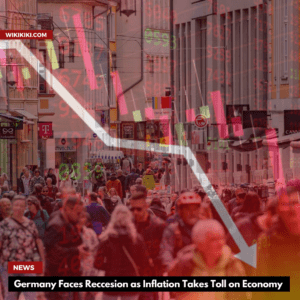Germany, Europe’s largest economy, has fallen into recession in the first quarter of 2023, as persistent inflation and energy supply disruptions due to the Russian invasion of Ukraine weigh heavily on the nation. This economic downturn marks the second consecutive quarter of contraction, with the economy shrinking by 0.3%.
The impact of high prices has significantly affected household spending, industrial orders, and government expenditure, leading to a challenging economic environment. While the recession was milder than initially predicted, Germany’s heavy reliance on Russian energy and ongoing inflationary pressures continue to pose challenges for its recovery.
Also Read: Apple’s iOS 17 Introduces Smart Display-like Lock Screen Feature for iPhones

Germany’s inflation rate reached 7.2% in April, surpassing the euro area’s average but remaining below that of the UK. Higher prices have resulted in reduced household spending on essential goods and services, including food, clothing, and furniture. Additionally, businesses have faced challenges due to increased energy costs, leading to weaker industrial orders. The persistence of high price increases has significantly burdened the German economy.
Factors Contributing to the Recession
Persistent Inflation: Germany’s inflation rate stood at 7.2% in April, above the euro area average, leading to higher prices for essential goods and services. This has impacted household spending on items like food, clothing, and furniture, resulting in decreased consumer demand.
Disruption in Gas Supplies: The Russian gas supplies to Germany were interrupted due to the invasion of Ukraine, exacerbating the energy crisis. Germany, heavily reliant on Russian energy imports, faced supply shortages and soaring energy prices, affecting industrial orders and business operations.
Government Spending Cuts: Government spending in Germany decreased by 4.9%, and reduced grants for electric and hybrid cars contributed to a decline in car sales. These austerity measures have further dampened economic activity.
Also Read: Brain Implants Enable Paralyzed Individuals to Walk Again
Energy Supply Disruptions and Economic Contraction
The invasion of Ukraine and subsequent disruption of Russian gas supplies have hit Germany hard, considering its significant reliance on Russian energy imports. The scarcity of energy resources led to soaring prices, affecting industrial operations and business performance. Industrial orders have weakened, reflecting the impact of higher energy costs on businesses and their ability to invest and expand.
Household Spending and Government Initiatives
Household consumption in Germany declined by 1.2% in the first quarter of 2023, reflecting the impact of inflation on purchasing power. Government spending also decreased by 4.9% during the same period, while reduced grants for electric and hybrid cars led to a decline in car sales. These factors contributed to the contraction of the economy. However, private sector investment and exports experienced slight growth, although it was not sufficient to offset the decline in consumer spending.
Outlook for the German Economy
Analysts anticipate continued weakness in the German economy during the second quarter of 2023. Factors such as a drop in purchasing power, reduced industrial orders, tightening monetary policies, and the expected slowdown of the U.S. economy all contribute to a pessimistic outlook. Nevertheless, the German central bank, the Bundesbank, expects a modest rebound in the economy in the April to June quarter, driven by a resurgence in industrial activity offsetting stagnant consumer spending.
Recessionary Indicators
A recession is defined as two consecutive quarters of economic contraction, which Germany now fulfills. The first quarter’s contraction of 0.3% follows a 0.5% decline in the previous quarter, underscoring the challenging economic situation. Household spending experienced a significant decline of 1.2% compared to the previous quarter, while government spending also decreased by 4.9%. Additionally, reduced car sales occurred as government grants for electric and hybrid vehicles were scaled back, further contributing to the economic downturn.
Also Read: Rapper Fetty Wap Sentenced to 6 Years in Prison for Drug Trafficking
Mitigating Factors and Future Prospects
Despite the recession, some positive developments have helped mitigate the severity of the economic decline. A mild winter and the reopening of China’s economy have alleviated some of the impact of higher energy prices. Private sector investment and exports experienced growth, but these factors were insufficient to pull Germany out of the recessionary danger zone. Looking ahead, the German central bank expects a modest rebound in the second quarter, driven by a resurgence in industrial activity offsetting stagnant consumer spending.
Weakest Among Advanced Economies
The International Monetary Fund (IMF) predicts that Germany will be the weakest among the world’s advanced economies in 2023, with a projected contraction of 0.1%. In contrast, the IMF upgraded its forecast for the UK from a contraction of 0.3% to a growth rate of 0.4%. These projections highlight the challenges faced by Germany and the need for effective economic policies to stimulate recovery.
Conclusion
Germany’s entry into a recession, propelled by high inflation and energy supply disruptions, raises concerns about the country’s economic performance and potential for growth. The impact of inflation on household spending and reduced government initiatives have contributed to the contraction of the economy. While some positive indicators, such as private sector investment and exports, offer a glimmer of hope, the overall outlook remains challenging. The German central bank expects a modest recovery, but the International Monetary Fund predicts Germany to be the weakest among advanced economies in 2023.
Also Read: Nvidia’s $300 Billion Rally in Artificial Intelligence Stocks



















+ There are no comments
Add yours